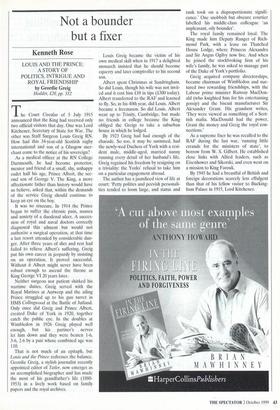Not a bounder but a fixer
Kenneth Rose
LOUIS AND THE PRINCE: A STORY OF POLITICS, INTRIGUE AND ROYAL FRIENDSHIP by Geordie Greig Hodder, £20, pp. 332
The Court Circular of 5 July 1915 announced that the King had received only two official visitors that day. One was Lord Kitchener, Secretary of State for War. The other was Staff Surgeon Louis Greig RN. How had this 34-year-old Scottish rugby international and son of a Glasgow mer- chant come to the notice of his sovereign?
As a medical officer at the RN College Dartmouth, he had become protector, mentor and friend of a small, shy, unhappy cadet half his age, Prince Albert, the sec- ond son of George V. The King, a more affectionate father than history would have us believe, asked that, within the demands of the service Greig should continue to keep an eye on the boy.
It was no sinecure. In 1914 the Prince began to suffer the chronic pain, nausea and anxiety of a duodenal ulcer. A succes- sion of royal and naval doctors correctly diagnosed this ailment but would not authorise a surgical operation, at that time a last resort attended by considerable dan- ger. After three years of diet and rest had failed to relieve Albert's suffering, Greig put his own career in jeopardy by insisting on an operation. It proved successful. Without it Albert might never have been robust enough to ascend the throne as King George VI 20 years later.
Neither surgeon nor patient shirked his wartime duties. Greig served with the Royal Marines at Antwerp and the ailing Prince struggled up to his gun turret in HMS Caingwood at the Battle of Jutland. Only once did Greig and Prince Albert, created Duke of York in 1920, together catch the public eye. In the doubles at Wimbledon in 1926 Greig played well enough, but his partner's nerves let him down and they were beaten 1-6, 3-6, 2-6 by a pair whose combined age was 110.
That is not much of an epitaph, but Louis and the Prince redresses the balance. Geordie Greig, a stylish journalist recently appointed editor of Tatler, now emerges as an accomplished biographer and has made the most of his grandfather's life (1880- 1953) in a lively work based on family papers and the royal archives.
Louis Greig became the victim of his own medical skill when in 1917 a delighted monarch insisted that he should become equerry and later comptroller to his second son.
Albert spent Christmas at Sandringham. So did Louis, though his wife was not invit- ed and it cost him £10 in tips (£300 today). Albert transferred to the RAF and learned to fly. So, in his 40th year, did Louis. Albert became a freemason. So did Louis. Albert went up to Trinity, Cambridge, but made no friends in college because the King obliged the Greigs to take a suburban house in which he lodged.
By 1923 Greig had had enough of the charade. So too, it may be surmised, had the newly-wed Duchess of York with a resi- dent male, middle-aged, married nanny running every detail of her husband's life. Greig regained his freedom by resigning on a triviality: the Yorks' refusal to take him on a particular engagement abroad.
The author has a jaundiced view of life at court: 'Petty politics and peevish personali- ties tended to loom large, and status and rank took on a disproportionate signifi- cance.' One snobbish but obscure courtier labelled his middle-class colleague 'an unpleasant, oily bounder'.
The royal family remained loyal. The King made him Deputy Ranger of Rich- mond Park, with a lease on Thatched House Lodge, where Princess Alexandra and Sir Angus Ogilvy now live. And when he joined the stockbroking firm of his wife's family, he was asked to manage part of the Duke of York's portfolio.
Greig acquired company directorships, became chairman of Wimbledon and nur- tured two rewarding friendships, with the Labour prime minister Ramsay MacDon- ald (who knighted him for his entertaining gossip) and the biscuit manufacturer Sir Alexander Grant. His grandson writes, 'They were viewed as something of a Scot- tish mafia. MacDonald had the power, Grant the money and Greig the royal con- nections.'
As a supreme fixer he was recalled to the RAF during the last war, 'running little errands for the ministers of state', to borrow from W. S. Gilbert. He established close links with Allied leaders, such as Eisenhower and Sikorski, and even went on a mission to King Farouk.
By 1945 he had a breastful of British and foreign decorations scarcely less effulgent than that of his fellow visitor to Bucking- ham Palace in 1915, Lord Kitchener.










































































 Previous page
Previous page